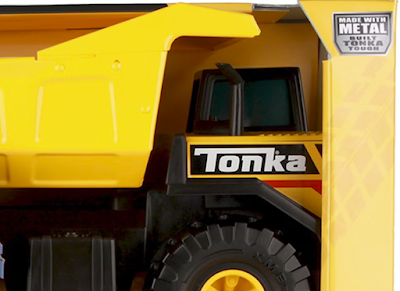* Being a bit loose with the definition of the term.
[Updated with cooler and longer video clip including Tonka truck as spare tire.]
As mentioned before, I always celebrate Christmas with a Toys-for-Tots haul, looking for nice toys that will stand up to lots of hard play. Metal Tonka trucks were an excellent option and I usually cleared out the store's stock.
The trucks were originally marketed as being nearly indestructible.
This year through, as I was loading my purchases into my car, I noticed that the trucks (which had been rebranded "Steel Classics") were now almost entirely made of plastic other than the bed.
I also noticed this claim on the box: MADE WITH METAL
This called to mind a passage from Dorothy L. Sayers' Murder Must Advertise.
“Hum!” said Parker. “Pretty extensive injuries for a fall of that kind.”
“So I thought, before I saw the staircase. To proceed. On the day after this occurrence, the sister of deceased sends to Mr. Pym a fragment of a half-finished letter which she has found on her brother's desk. It warns him that there is something of a fishy nature going on in the office. The letter is dated about ten days previous to the death, and appears to have been laid aside as though the writer wanted to think over the wording a bit more carefully. Very good. Now, Mr. Pym is a man of rigid morality—except, of course, as regards his profession, whose essence is to tell plausible lies for money—”
“How about truth in advertising?”
“Of course, there is some truth in advertising. There's yeast in bread, but you can't make bread with yeast alone. Truth in advertising,” announced Lord Peter sententiously, “is like leaven, which a woman hid in three measures of meal. It provides a suitable quantity of gas, with which to blow out a mass of crude misrepresentation into a form that the public can swallow. Which incidentally brings me to the delicate and important distinction between the words 'with' and 'from.' Suppose you are advertising lemonade, or, not to be invidious, we will say perry. If you say 'Our perry is made from fresh-plucked pears only,' then it's got to be made from pears only, or the statement is actionable; if you just say it is made 'from pears,' without the 'only,' the betting is that it is probably made chiefly of pears; but if you say, 'made with pears,' you generally mean that you use a peck of pears to a ton of turnips, and the law cannot touch you—such are the niceties of our English tongue.”
“Make a note, Mary, next time you go shopping, and buy nothing that is not 'from, only.' Proceed, Peter—and let us have a little less of your English tongue.”




No comments:
Post a Comment